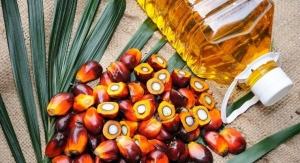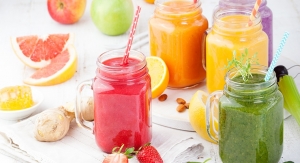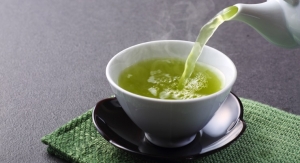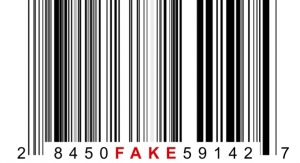01.03.17
Changing demographics and purchasing behaviors make it crucial for beverage industry leaders to understand and capitalize on key consumer insights that identify growing trends. Evergreen Packaging, a leader in creating fiber-based packaging solutions, has worked with EcoFocus Worldwide to identify four key trends from the annual EcoFocus Trend Study that reveals growing themes expected to impact the industry this year.
"The research reveals key areas brands must deliver on in order to appeal to discerning consumers in 2017," said Erin Reynolds, marketing director for Evergreen Packaging. "The consumer insights gained through the EcoFocus Trend Study reveal opportunities for choosing packaging that provides appropriate product protection and aligns with enhanced brand values for health and environmental responsibility. At Evergreen Packaging we are committed to helping our customers achieve their corporate goals and meeting changing consumer needs."
The survey, conducted independently by EcoFocus Worldwide, examines wellness and sustainability trends impacting the food and beverage industry. In its seventh year, new study results show how consumer tastes, demographics and values are reshaping purchasing decisions. These shifts in consumer priorities are prompting companies to make changes. From Walmart's commitment to sustainably sourced packaging to McDonalds' pledge to source 100% of all fiber-based packaging from recycled or certified sources by 2020, it is clear that fresh and sustainable will be trends at the heart of consumer demands throughout 2017.
"These study results show that a majority of grocery shoppers have identified products' fresh, clean, and sustainable benefits among their top purchase priorities when it comes to healthier choices," said study author and EcoFocus Worldwide CEO Linda Gilbert. "The message is clear: if you are a brand aiming to attract consumers to your healthy beverages, be sure your packaging and processing line up with your ingredient list. And be sure to tell your fresh and clean story effectively on your packaging."
Insights from the research call out four trends: 1) Millennials' impact on food and beverage priorities, 2) the importance of clean packaging, 3) the power of leveraging of fresh and clean attributes to position healthy products, and 4) the growing popularity of functional beverages:
1. Millennial Motivators
Millennials hold huge buying power in today's market, and are expected to spend more than $200 billion in 2017 alone. In order to successfully reach Millennials, it's important for brands to understand what influences their purchasing. According to Forbes, more than 50% of Millennials make an effort to buy products from companies that support the causes they care about, and they're twice as likely to care about whether or not their food is organic than any other generation. The EcoFocus survey results illustrate additional details that tie into this larger national trend:
2. Clean Packaging Gains Momentum
EcoFocus Study results show the strong clean labeling movement is expanding to clean processing and clean packaging trends. The rules have been rewritten and clean and clear labeling is the new global standard, extending to a more holistic demand for a clean supply chain. These demands apply to packaging as brands are expanding their transparency on all fronts—from supply chain details to their packaging choices. The EcoFocus study shows:
70% of Grocery Shoppers strongly agree or agree that foods and beverages with healthier ingredient lists should use packaging materials that are healthier too. (74% of Millennials)
With the demand for healthier packaging materials, it's important to keep in mind that 86% of Grocery Shoppers and 87% of Millennials believe some types of packaging can leave undesirable chemicals in beverages. They say cartons and glass containers are the least likely to do so—and that cartons and glass best protect freshness without preservatives.
3. The New Value-Add: Fresh + Clean = Healthy
The definition of what makes foods and beverages healthier is becoming increasingly complex. Clean ingredients have moved from a trend to the norm for many categories and brands. Creating products that are fresh and eco-friendly is the new go-to as these attributes will become increasingly crucial contributors to consumer's measurement of "healthy" in 2017.
74% of Grocery Shoppers and 78% of Millennials say better personal health is a big benefit of an eco-friendly lifestyle.
Many brands have already taken out preservatives and removed artificial ingredients—the next challenge is to leverage packaging to convey and deliver freshness without the chemicals that consumers view as undesirable for their health. Brands need to ask themselves if their packaging is aligned with their focus on clean ingredients and messaging.
4. Naturally Functional Beverages
Consumers are increasingly looking to beverages to play new roles in their diets and health routines. Drinkable breakfasts and the "snackification" of beverages are fueled by consumer interest in nutrition and performance drinks that act as meal replacements and guilt-free snacks. In fact, the carbonated soft drink category is continuing a five-year decline while demand for natural and organic drinks increases as consumers gravitate toward healthier options, with natural beverages driving 40% of dollar growth in the industry. Industry leaders should expect consumers in 2017 to demand beverages that work harder, whether for refreshment, satiety, energy, immunity boosting, sleep aid, blood sugar management, or a host of other functional benefits now associated with these multifunctional power beverages.
When identifying the most desirable nutritional attributes for healthy beverages, grocery shoppers surveyed shared the following preferences:
These findings reveal important communication, innovation, and value-added opportunities for beverage manufacturers as they make key decisions in 2017. Overall, consumers put high priorities on making healthy and environmentally responsible purchases. "For consumers, the priorities of health and sustainability are clearly linked together, packaging has a growing role in their perception of both of these attributes," said Gilbert. "These are powerful synergies that speak to the 2017 consumer's holistic view of what is healthy."
"The research reveals key areas brands must deliver on in order to appeal to discerning consumers in 2017," said Erin Reynolds, marketing director for Evergreen Packaging. "The consumer insights gained through the EcoFocus Trend Study reveal opportunities for choosing packaging that provides appropriate product protection and aligns with enhanced brand values for health and environmental responsibility. At Evergreen Packaging we are committed to helping our customers achieve their corporate goals and meeting changing consumer needs."
The survey, conducted independently by EcoFocus Worldwide, examines wellness and sustainability trends impacting the food and beverage industry. In its seventh year, new study results show how consumer tastes, demographics and values are reshaping purchasing decisions. These shifts in consumer priorities are prompting companies to make changes. From Walmart's commitment to sustainably sourced packaging to McDonalds' pledge to source 100% of all fiber-based packaging from recycled or certified sources by 2020, it is clear that fresh and sustainable will be trends at the heart of consumer demands throughout 2017.
"These study results show that a majority of grocery shoppers have identified products' fresh, clean, and sustainable benefits among their top purchase priorities when it comes to healthier choices," said study author and EcoFocus Worldwide CEO Linda Gilbert. "The message is clear: if you are a brand aiming to attract consumers to your healthy beverages, be sure your packaging and processing line up with your ingredient list. And be sure to tell your fresh and clean story effectively on your packaging."
Insights from the research call out four trends: 1) Millennials' impact on food and beverage priorities, 2) the importance of clean packaging, 3) the power of leveraging of fresh and clean attributes to position healthy products, and 4) the growing popularity of functional beverages:
1. Millennial Motivators
Millennials hold huge buying power in today's market, and are expected to spend more than $200 billion in 2017 alone. In order to successfully reach Millennials, it's important for brands to understand what influences their purchasing. According to Forbes, more than 50% of Millennials make an effort to buy products from companies that support the causes they care about, and they're twice as likely to care about whether or not their food is organic than any other generation. The EcoFocus survey results illustrate additional details that tie into this larger national trend:
- Millennials are leading the escape from mass produced, over-processed and over-packaged foods and beverages with a demand for real, less processed ingredients. They want the preservatives and artificial ingredients out, and natural, nutrient-dense ingredients in.
- 69% of Millennials have changed what they buy in order to avoid artificial ingredients in foods and beverages.
- Millennials aren't just thinking about the product's contents, they are differentiating packaging for improved personal and planetary health.
- 73% say they try to buy products in packaging that is recyclable.
- 59% say they look for beverages in packaging that is made with renewable materials.
2. Clean Packaging Gains Momentum
EcoFocus Study results show the strong clean labeling movement is expanding to clean processing and clean packaging trends. The rules have been rewritten and clean and clear labeling is the new global standard, extending to a more holistic demand for a clean supply chain. These demands apply to packaging as brands are expanding their transparency on all fronts—from supply chain details to their packaging choices. The EcoFocus study shows:
70% of Grocery Shoppers strongly agree or agree that foods and beverages with healthier ingredient lists should use packaging materials that are healthier too. (74% of Millennials)
With the demand for healthier packaging materials, it's important to keep in mind that 86% of Grocery Shoppers and 87% of Millennials believe some types of packaging can leave undesirable chemicals in beverages. They say cartons and glass containers are the least likely to do so—and that cartons and glass best protect freshness without preservatives.
3. The New Value-Add: Fresh + Clean = Healthy
The definition of what makes foods and beverages healthier is becoming increasingly complex. Clean ingredients have moved from a trend to the norm for many categories and brands. Creating products that are fresh and eco-friendly is the new go-to as these attributes will become increasingly crucial contributors to consumer's measurement of "healthy" in 2017.
74% of Grocery Shoppers and 78% of Millennials say better personal health is a big benefit of an eco-friendly lifestyle.
Many brands have already taken out preservatives and removed artificial ingredients—the next challenge is to leverage packaging to convey and deliver freshness without the chemicals that consumers view as undesirable for their health. Brands need to ask themselves if their packaging is aligned with their focus on clean ingredients and messaging.
- 71% of Grocery Shoppers say that packaging that keeps beverages fresh without preservatives is the most important quality for healthy beverage packaging. (72% of Millennials)
- Grocery shoppers' perception of different packaging materials heavily impacts the grocery industry. Smart brands and retailers must align with consumer values and effectively communicate the commitments behind their product, processing and packaging choices.
- 67% of Grocery Shoppers and 69% of Millennials say recyclable packaging is an extremely or very important quality for healthy beverage packaging.
- 59% of Grocery Shoppers and 64% of Millennials say packaging made with renewable materials is an extremely or very important quality for healthy beverage packaging.
4. Naturally Functional Beverages
Consumers are increasingly looking to beverages to play new roles in their diets and health routines. Drinkable breakfasts and the "snackification" of beverages are fueled by consumer interest in nutrition and performance drinks that act as meal replacements and guilt-free snacks. In fact, the carbonated soft drink category is continuing a five-year decline while demand for natural and organic drinks increases as consumers gravitate toward healthier options, with natural beverages driving 40% of dollar growth in the industry. Industry leaders should expect consumers in 2017 to demand beverages that work harder, whether for refreshment, satiety, energy, immunity boosting, sleep aid, blood sugar management, or a host of other functional benefits now associated with these multifunctional power beverages.
When identifying the most desirable nutritional attributes for healthy beverages, grocery shoppers surveyed shared the following preferences:
- 63% are seeking a good source of calcium.
- 61% are looking for beverages that are a good source of fiber.
- 61% want their beverages to contain lowered or reduced sugar.
- 60% are drawn to beverages that are a good source of antioxidants.
- 57% want to consume beverages with increased protein.
- 55% buy beverages because they are a good source of omega 3.
- 46% of grocery shoppers are looking for beverages that contain probiotics.
These findings reveal important communication, innovation, and value-added opportunities for beverage manufacturers as they make key decisions in 2017. Overall, consumers put high priorities on making healthy and environmentally responsible purchases. "For consumers, the priorities of health and sustainability are clearly linked together, packaging has a growing role in their perception of both of these attributes," said Gilbert. "These are powerful synergies that speak to the 2017 consumer's holistic view of what is healthy."





















